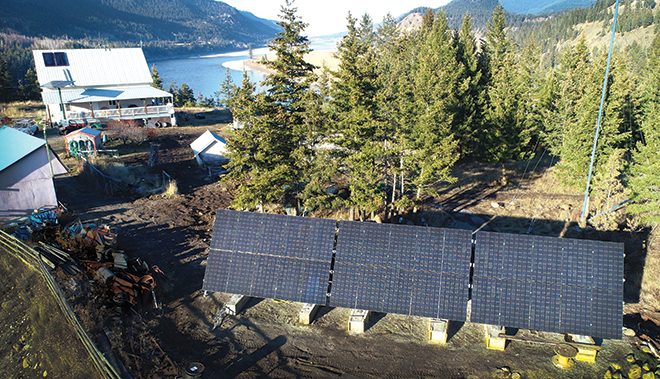By Ron Young –
In much of the world solar energy is rapidly becoming mainstream power. In Germany, one of the world’s most industrialized nations, renewables overtook coal as the leading source of power and now account for 41 per cent of the country’s electricity. Germany recently announced that it will begin to shut down all 84 of its coal fired power plants. Germany gets less sun than many parts of Canada, including BC’s Cariboo, yet they’re planning to use the sun as their primary electricity source in years to come.

With the legitimacy of solar power no longer in question and the dramatic cost reductions in recent years there is no good reason not to consider solar energy as a viable electricity source for your home, farm, lodge, or off-grid residence.
There are three ways to implement solar energy as a power source for your household. The first thing to ask yourself is: Is there good southerly exposure to the sun during the primary solar radiation hours between 11 a.m.–3 p.m.? If the answer is yes and you can position solar panels either on a roof, a ground area, or pole mount without obstruction then consider the following scenarios and choose which one fits your circumstances. Here you have to make several key decisions about your objectives.
In our first scenario you have decided you just want some power back up for those situations where the main grid power is down. Depending on where you live on the grid in the Cariboo, power outages can be either a minor inconvenience lasting no more than two or three hours or can potentially be a regular serious concern lasting many hours or even days. Power back-up systems for those two extremes look very different and costs can range from just a few hundred dollars to several thousand.
In our second scenario you have decided you’ve simply had enough of high power bills and you want to reduce or even eliminate your monthly hydro bill but you’re not ready to go completely off the BC hydro grid. This plan involves harvesting your own electricity with solar panels, using your solar generated power in your household, and passing any extra into the grid for the benefit of others. Of course, you get credit for the surplus that you generate. The more solar panels you put up, the lower your power bill. It all depends on your budget. BC hydro calls this scenario “net-metering” and the application process is a simple one-page document. Cost can start from $2,500 to as much as $50,000.
In our third scenario you want to live completely off the BC hydro electricity grid, somewhere –‘home…home on the range, where the deer and the caribou play…’ While living life large in the boonies you still want all the comforts of a modern electrical lifestyle including lights, TV, computer, internet, etc. It’s all possible using solar panels, battery storage, and appropriate devices that marry your ordinary appliances with the energy stored in your batteries. Costs are typically from $2,500 to $25,000, or more if you have larger demands like a ranch or lodge.
The important thing about any of these scenarios is that solar is a tool, or a set of keys if you will, to doors with many different outcomes depending on your passions, your budget, and your expectations.
Once you have decided on one of the above scenarios or some variation, then you can proceed to the final consideration. Are you looking at a lifestyle choice, an investment, or a necessity? The answer will largely determine the budget you will set for your solar system.
A very important consideration that goes hand in hand with renewable energy systems is the efficiency of your energy usage. How old are your appliances? How do they rate against the government Energy Star and Energuide ratings for efficiency? Is your home well insulated? Do you have double or triple glaze windows or LED lighting? What are your habits? Do you turn off lights, turn down the heat, turn off the TV, radio, coffee maker, or block heater? The answer to these questions also determines the size and thus the ultimate cost of your renewable system.
In the end few things will give you as much satisfaction as operating your own power company on the free energy from the sun while increasing the value of your largest investment, your home. Solar energy is one of the few infrastructure improvements that will actually pay for itself over time.
Ron Young is a renewable energy professional operating the earthRight Store in Williams Lake since 1993. He can be reached at [email protected].
